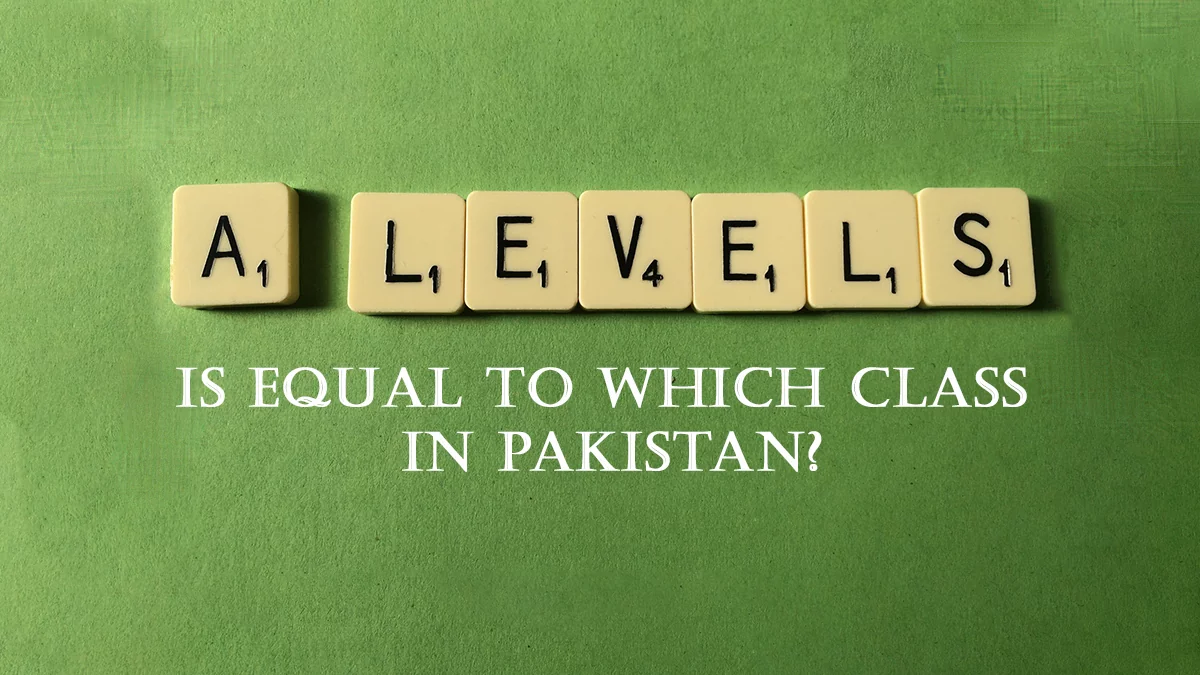Navigating the educational landscape of Pakistan can be a complex affair, especially when it comes to understanding the equivalency of various qualifications and certifications. Among the plethora of educational pathways, A Level stands out as a globally recognized qualification that opens doors to higher education opportunities both within Pakistan and abroad. However, many individuals remain unclear about its equivalence to the Pakistani educational system.
Understanding the Education System in Pakistan
To understand where A Level education fits into the Pakistani education system, it’s important to first have a basic understanding of how the system is structured.
The education system in Pakistan is divided into three main phases:
1. Primary education
2. Secondary education
3. Higher education
Primary education covers grades 1 to 5, secondary education covers grades 6 to 10, and higher education includes undergraduate and postgraduate degrees. In the Pakistani education system, secondary education is further divided into two phases:
1.Matriculation (SSC)
2. Intermediate (HSSC)
Matriculation, or the Secondary School Certificate (SSC) level, consists of grades 9 and 10. After completing Matriculation, students can choose to pursue Intermediate, which includes grades 11 and 12. This is where the confusion arises regarding A Levels, as many students wonder whether it is equivalent to Class 11 or Class 12.
The answer is that A Level education is equivalent to Class 12 in the Pakistani education system. After completing their A Levels, students can directly apply for undergraduate programs in Pakistani universities, bypassing the intermediate stage. A Levels is recognized as an advanced qualification and provides students with a solid foundation for higher education and future career opportunities.
So, if you’re planning to pursue A Levels in Pakistan, rest assured that it is equivalent to Class 12, and it opens up a world of possibilities for your academic and professional journey.
Explaining the A-Level Qualification
A Levels, short for Advanced Levels, is a qualification offered by educational boards in the United Kingdom. It is recognized worldwide and provides students with a rigorous and comprehensive education. A Levels are typically taken after completing the General Certificate of Secondary Education (GCSE) and are seen as a more specialized and in-depth study of subjects.
In the A Level program, students usually choose three to four subjects to focus on, which they study over a two-year period. The subjects can vary widely and can include both arts and sciences. The coursework is more challenging compared to previous levels of education, with an emphasis on critical thinking, independent research, and analytical skills.
One unique feature of A Levels is the flexibility it offers. Students have the freedom to choose subjects that align with their interests, strengths, and future career aspirations. This allows them to specialize in specific areas and stand out when applying for higher education or jobs.
Additionally, A Levels are a stepping stone to international universities, as they are recognized and valued by institutions around the world. The qualifications obtained from A Levels can open doors to prestigious universities and provide students with a competitive advantage in the global job market.
Overall, A Levels are a highly regarded qualification that equips students with the skills and knowledge needed for higher education and future success. They provide a comprehensive and well-rounded education, allowing students to explore their interests and achieve their academic goals.
Mapping A-Level Education to the Pakistani Education System
Mapping A-Level education into the Pakistani education system is a common concern among students and parents. A-Level education is equivalent to Class 12 in the Pakistani education system. After completing A-Levels, students can directly apply for undergraduate programs in Pakistani universities, bypassing the intermediate stage. This recognition and equivalence make A-Levels a valuable qualification for students in Pakistan.
The A-Level curriculum provides students with a comprehensive and well-rounded education, emphasizing critical thinking, independent research, and analytical skills. This rigorous program prepares students for higher education and future career opportunities. It also offers flexibility, allowing students to choose subjects that align with their interests and future goals.
Furthermore, A-Level qualifications are recognized and valued by higher education institutions worldwide. This recognition opens doors to prestigious universities globally, providing students with a competitive advantage in the global job market.
By choosing A-Level education in Pakistan, students can embrace a world-class education that equips them with the necessary skills and knowledge for success in their academic and professional journey. It offers a unique opportunity to explore their interests, specialize in specific areas, and pave the way for a bright future.
Also Read: What is the Difference Between FSc and A-levels?

Equivalence of A-Levels with Pakistani Classes
One of the most frequently asked questions about A Levels in Pakistan is regarding their equivalence with Pakistani classes. In the Pakistani education system, A Level education is equivalent to Class 12. After completing their A Levels, students can directly apply for undergraduate programs in Pakistani universities, bypassing the intermediate stage. This recognition and equivalence make A Levels a valuable qualification for students in Pakistan.
But why is this equivalence important? A Level of education offers a comprehensive and well-rounded curriculum, emphasizing critical thinking, independent research, and analytical skills. By choosing A Levels, students can embrace a world-class education that equips them with the necessary skills and knowledge for success in their academic and professional journey.
Moreover, A Levels are recognized and valued by higher education institutions worldwide. This recognition opens doors to prestigious universities globally, providing students with a competitive advantage in the global job market. By pursuing A Levels in Pakistan, students can explore their interests, specialize in specific areas, and pave the way for a bright future.
So, if you’re considering A Levels in Pakistan, rest assured that it is equivalent to Class 12 and holds immense value for your academic and professional endeavors.
A-Levels vs. Intermediate (FSc/FA) in Pakistan
As we explore the equivalence of A Levels with Pakistani classes, it is important to address the comparison between A Levels and Intermediate (FSc/FA) in Pakistan. Both options have their own unique features and advantages, making it essential to understand the differences and make an informed decision.
Intermediate, also known as FSc (Faculty of Science) or FA (Faculty of Arts), is a two-year program offered in Pakistani colleges. It is a pre-university qualification that students typically pursue after completing Matriculation (SSC). Intermediate consists of two parts: Part 1 (11th grade) and Part 2 (12th grade). The curriculum includes a variety of subjects, both science and arts-based, depending on the student’s chosen stream.
On the other hand, A Levels is an internationally recognized qualification offered by the United Kingdom educational boards. A Levels provide students with a more specialized and in-depth study of subjects. Students typically choose three to four subjects to focus on, allowing them to specialize in areas aligned with their interests and future goals.
The major difference between A Levels and Intermediate lies in the curriculum and level of difficulty. A Levels have more challenging coursework, emphasizing critical thinking, independent research, and analytical skills. It is a comprehensive program that prepares students for higher education on a global scale.
Moreover, A Levels offer greater flexibility in subject choices compared to Intermediate. Students have the freedom to select subjects that align with their interests and aspirations, allowing them to stand out when applying for higher education or jobs.
In terms of recognition, A Levels are valued by higher education institutions worldwide. They provide students with a competitive advantage in the global job market and open doors to prestigious universities globally.
While Intermediate is a suitable option for students who wish to pursue higher education in Pakistan, A Levels offer a broader range of opportunities, including international university pathways.
Also read: How many subjects are in A-Level in Pakistan?
Recognizing A-Level Qualifications by Pakistani Higher Education Institutions
When it comes to recognizing A-Level qualifications in Pakistan, higher education institutions in the country value and acknowledge the importance of this internationally recognized qualification. A-Levels hold significant weight and are seen as a valuable qualification by universities in Pakistan. Students who have completed their A-Levels can directly apply for undergraduate programs in Pakistani universities, bypassing the intermediate stage.
This recognition by Pakistani higher education institutions opens up numerous opportunities for A-Level graduates. They can pursue a wide range of fields and disciplines, including engineering, medicine, business, humanities, and more. The rigorous coursework and comprehensive education provided by A Levels prepare students for the challenges they may face in higher education.
Additionally, A-Level qualifications are highly regarded globally, making A-Level graduates competitive candidates for prestigious universities worldwide. This recognition gives A-Level graduates a unique advantage in the global job market, as employers also value the international standard of education that A-Levels provide.
Overall, the recognition of A-Level qualifications by Pakistani higher education institutions allows students to embrace a world-class education, gain access to various fields of study, and pursue their academic and professional aspirations.
Benefits of Pursuing A-Levels in Pakistan
Pursuing A-Levels in Pakistan offers numerous benefits for students seeking a high-quality education. One of the key advantages is the comprehensive and well-rounded curriculum that A-Levels provide. The coursework is challenging and emphasizes critical thinking, independent research, and analytical skills, preparing students for the rigors of higher education.
Another benefit of A-Levels is the flexibility they offer. Students have the freedom to choose subjects that align with their interests and future career goals. This allows them to specialize in specific areas and stand out when applying for higher education or jobs. The diverse range of subjects available in A-Levels enables students to explore their passions and tailor their education to their individual strengths.
Additionally, A-Levels are recognized and valued by higher education institutions worldwide. This recognition opens doors to prestigious universities globally, providing students with a competitive advantage in the global job market. A-Levels are a stepping stone to international opportunities and give students the option to pursue higher education abroad.
Overall, pursuing A-Levels in Pakistan equips students with a world-class education, fosters critical thinking and analytical skills, and provides a pathway to success in both academia and the professional world.
Exploring Career and Higher Education Pathways for A-Level Graduates in Pakistan
A-Level education in Pakistan opens up a plethora of career and higher education pathways for graduates. With their rigorous coursework and comprehensive education, A-Level graduates are well-equipped to excel in various fields and disciplines.
One of the key advantages of pursuing A-Levels is the recognition and value they hold in Pakistani higher education institutions. A-Level graduates can directly apply for undergraduate programs in Pakistani universities, bypassing the intermediate stage. This recognition allows them to pursue a wide range of fields, including engineering, medicine, business, humanities, and more.
Moreover, A-Levels are highly regarded globally, making graduates competitive candidates for prestigious universities worldwide. This recognition gives A-Level graduates a unique advantage in the global job market, as employers also value the international standard of education that A-Levels provide.
By pursuing A-Levels in Pakistan, students have the opportunity to embrace a world-class education, gain access to various fields of study, and pave the way for a successful academic and professional future. Whether it’s pursuing higher education locally or internationally, A-Levels offer a pathway to a fulfilling career and a world of possibilities.
Conclusion: Embracing the Opportunities of A-Level Education in Pakistan
In conclusion, A-Level education in Pakistan offers students a world of opportunities and opens doors to a successful academic and professional future. By pursuing A-Levels, students can embrace a comprehensive and well-rounded education that emphasizes critical thinking, independent research, and analytical skills. This rigorous program prepares students for higher education on a global scale and equips them with the necessary skills and knowledge to excel in various fields and disciplines.
One of the key advantages of A-Levels is their recognition and value by higher education institutions in Pakistan. A-Level graduates can directly apply for undergraduate programs in Pakistani universities, bypassing the intermediate stage. This recognition allows them to pursue a wide range of fields, from engineering to medicine, business to humanities, and more.
Moreover, the international recognition of A-Level qualifications gives graduates a competitive advantage in the global job market. A-Levels are highly regarded by prestigious universities worldwide, providing students with the opportunity to pursue higher education abroad.
By choosing A-Levels in Pakistan, students can explore their interests, specialize in specific areas, and pave the way for a bright future. Embrace the opportunities of A-Level education and embark on a journey towards academic excellence and professional success.











